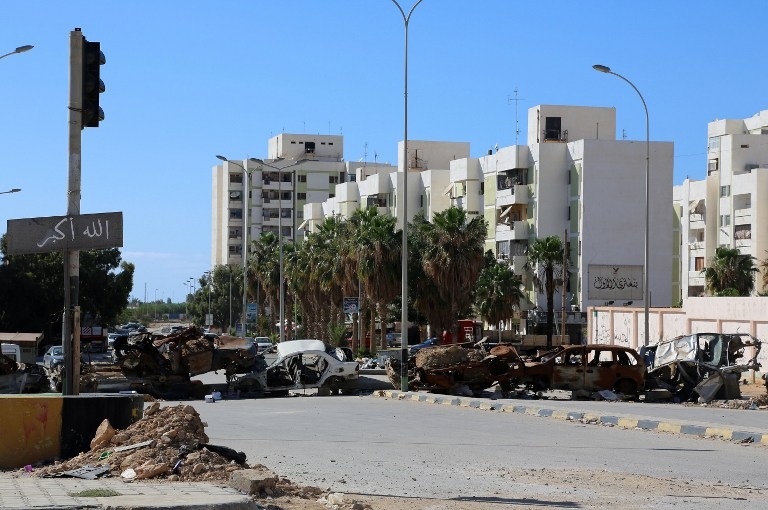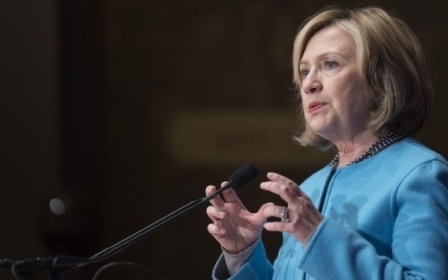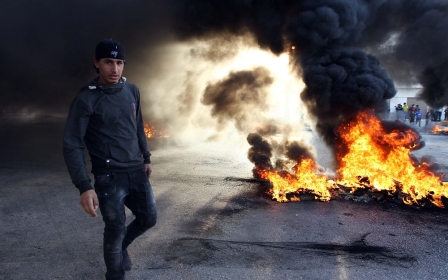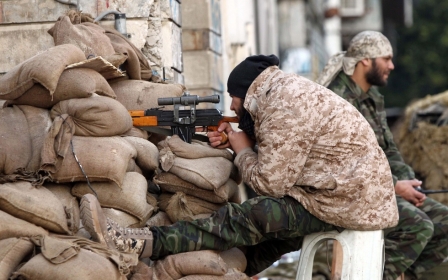Clashes continue in Libya's Benghazi

At least 17 Libyan army soldiers belonging to former General Khalifa Haftar’s brigades were killed while 50 others were injured when violent clashes broke out between Haftar’s forces and the Shura Council forces, near Benghazi on Monday night.
Local sources confirmed that only one fighter among the Council’s forces was killed during the clashes which continued for several hours into the night, reported Aljazeera.
The clashes, concentrated in Sabri and Groth north and west of Benghazi, broke out after council forces advanced into areas controlled by Haftar, while his forces withdrew from their positions leaving behind weapons, ammunition and military vehicles.
At the same time, Libya’s self-declared government in control of the capital Tripoli has launched airstrikes on Islamic State fighters in the city of Sirte, officials and witnesses said yesterday.
Suleiman al-Tariki, a security source in Sirte, told the Anadolu Agency that the Tripoli-based government’s air forces' strikes killed more than a dozen IS fighters east of Benghazi.
Officials said the late on Sunday night that attacks were launched on a building where fighters had gathered.
Fighters allied to IS in Iraq and Syria have been gaining ground in Libya, where two rival governments are battling for control and militants have taken advantage of the security vacuum. IS fighters have gained ground in Libyan cities including Sirte and Derna to the east, challenging local armed groups and government forces alike.
“Warplanes of the air force of the GNC conducted airstrikes last night on an internal security building in Sirte,” Ministry of Defence spokesman Mohamed Abdulkafi said by phone, referring to the Tripoli-based General National Congress (GNC).
“The strikes targeted a gathering of IS militants,” he said.
Meanwhile a car bomb exploded near Libyan army front lines just west of Benghazi on Monday, killing at least four soldiers and wounding 20 more as part of a militant assault, a military source told Reuters.
Benghazi has been the centre of fighting between forces allied with Libya’s internationally recognised government and various militant groups, including the Islamic State and a rival alliance of local forces.
Libya is sliding deeper into chaos as fighting between two main armed factions of former rebels and their political allies, who overthrew Gaddafi four years ago, have turned against each other.
The self-declared GNC has run Tripoli since its forces took over the capital in the summer of 2014, forcing the internationally recognised government of Prime Minister Abdullah al-Thinni to operate from the east.
UN peace talks to broker a ceasefire and reach a power-sharing deal between the two factions have been struggling.
At the same time, European powers have been pushing for an agreement, worried Libya is becoming a safe haven for militants and for people-smugglers ferrying illegal migrants to Europe.
Libyan forces warn EU
Against a backdrop of increasing chaos, forces from Libya's Tobruk-based government warned European countries that any vessels entering Libyan waters without permission would be targeted by airstrikes.
The warning came after European Union foreign ministers agreed on Monday to launch a naval operation to combat people smugglers who have brought thousands of migrants on perilous journeys to Europe from Libya.
Securing consent from Libya, where two rival governments and their armed forces are battling in a chaotic power struggle, has been a major concern for European powers trying to stem an increasing flow of migrants from Libya's shores.
"Any vessel found in Libyan waters without previous cooperation or permission will be targeted by the air force," Libyan air force commander Saqr Al-Jaroushi told Reuters late on Monday.
The EU naval operation will be limited to intelligence-gathering for the time being because it has yet to obtain United Nations authorisation for a wider scope of operations.
New MEE newsletter: Jerusalem Dispatch
Sign up to get the latest insights and analysis on Israel-Palestine, alongside Turkey Unpacked and other MEE newsletters
Middle East Eye delivers independent and unrivalled coverage and analysis of the Middle East, North Africa and beyond. To learn more about republishing this content and the associated fees, please fill out this form. More about MEE can be found here.




